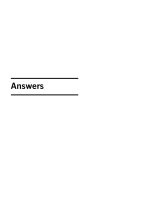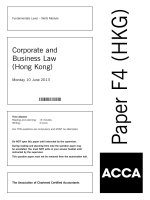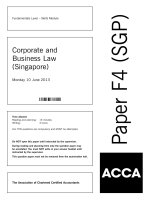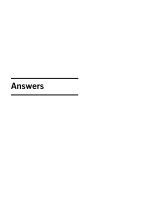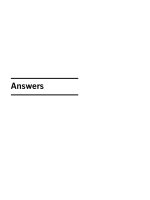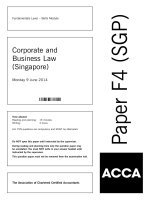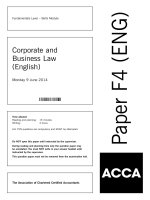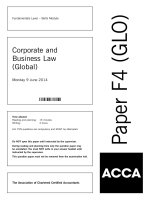ACCA f4 corporate and business law vietnam 2012 jun q
Bạn đang xem bản rút gọn của tài liệu. Xem và tải ngay bản đầy đủ của tài liệu tại đây (67.99 KB, 4 trang )
Corporate and
Business Law
(Vietnam)
Monday 18 June 2012
Time allowed
Reading and planning:
Writing:
15 minutes
3 hours
ALL TEN questions are compulsory and MUST be attempted.
Do NOT open this paper until instructed by the supervisor.
During reading and planning time only the question paper may
be annotated. You must NOT write in your answer booklet until
instructed by the supervisor.
This question paper must not be removed from the examination hall.
The Association of Chartered Certified Accountants
The Ministry of Finance of the Socialist Republic of Vietnam
Paper F4 (VNM)
Fundamentals Level – Skills Module
ALL TEN questions are compulsory and MUST be attempted
1
In relation to the Vietnamese legal system:
(a) Explain the main sources of law.
(7 marks)
(b) Explain the significance of the judiciary being independent from the legislature and executive.
(3 marks)
(10 marks)
2
In relation to contract law, explain any FIVE means through which obligations may be secured.
(10 marks)
3
In relation to employment law, define the THREE types of labour contract as set out in the Labour Code, and
explain the statutory limitations that apply to each.
(10 marks)
4
In relation to company law, explain the meaning and significance of separate legal personality.
(10 marks)
5
In relation to capital and financing, explain how the legal relationship between a company and its shareholders
differs from that of a company with its long-term creditors.
(10 marks)
6
In relation to the management and administration of a company:
(a) Explain the provisions of the Law on Enterprises in respect of the appointment, and criteria for membership,
of the Inspection Committee.
(4 marks)
(b) Describe the duties and powers of the Inspection Committee.
(6 marks)
(10 marks)
7
In relation to insolvency:
(a) Explain the meaning of insolvency.
(2 marks)
(b) Explain the provisions of the Law on Bankruptcy in respect of the parties that may file a petition to
commence bankruptcy proceedings.
(8 marks)
(10 marks)
2
8
Bao is a builder who specialises in home improvements. He entered into a contract with Khanh to build an extension
to her house.
Half way through the work, Bao informed Khanh that he would be unable to complete the job and that she would
have to get another builder to finish the extension. He told Khanh that he was unable to recommend anyone to
complete the work. The contract between Bao and Khanh made no provision for partial completion of the extension.
Khanh engaged the services of a different builder who was prepared to complete the extension, but was informed that
her total expenditure would be 50% higher than under the original contract.
Required:
Discuss the potential consequences of Bao’s withdrawal from the contract in each of the following circumstances:
(a) His withdrawal was due to the offer of an alternative project that was more attractive financially.
(5 marks)
(b) His withdrawal was caused by the sudden illness of his mother, who had to be cared for on a full-time basis.
(5 marks)
(10 marks)
9
FBP Company is a shareholding company.
A general meeting of shareholders was held on 16 May to discuss important and controversial changes to the
company’s charter. The meeting was due to start at 10.00 am, but due to an unexpectedly large number of
shareholders attending, the chairman was informed by the administrators of the meeting hall that it would be unsafe
to proceed, and that a larger hall would not be available until the afternoon. The chairman decided that the start of
the meeting would be delayed, and announced that it would begin at 1.00 pm in the larger hall.
The meeting was held that afternoon and took several decisions, despite considerable opposition from some of the
shareholders.
Many of the shareholders were particularly angry because they could not attend the meeting in the afternoon, having
taken time off work for the morning only. These shareholders collectively held 25% of the shares in the company.
They informed the chairman that they strongly objected to the decisions taken, stating that had they attended the
meeting, they would have made their objections known and would have voted against the proposals. The chairman
replied that the decision of the meeting was final, and the matters were now closed.
Required:
(a) Explain the provisions of the Law on Enterprises in respect of the right of shareholders to apply to the court
to cancel resolutions passed at the general meeting.
(3 marks)
(b) Discuss the extent to which the actions of the chairman were lawful, and whether the shareholders who could
not attend the meeting would be able to take any further actions.
(7 marks)
(10 marks)
3
[P.T.O.
10 Giang and Hung are major shareholders and directors of YWS, a shareholding company.
The financial statements of YWS Company showed a loss of 20 million dong in 2008, a loss of 12 million dong in
2009 and a profit of 48 million dong in 2010. The company also revalued some of its land holdings in 2010, with
a result that its non-current assets increased in value by 80 million dong.
Giang and Hung recommended a payment of 64 million dong in dividends to the general meeting of shareholders.
Required:
(a) Explain whether the dividend payment was legal.
(7 marks)
(b) Discuss any potential liability for the dividend payment.
(3 marks)
(10 marks)
End of Question Paper
4
